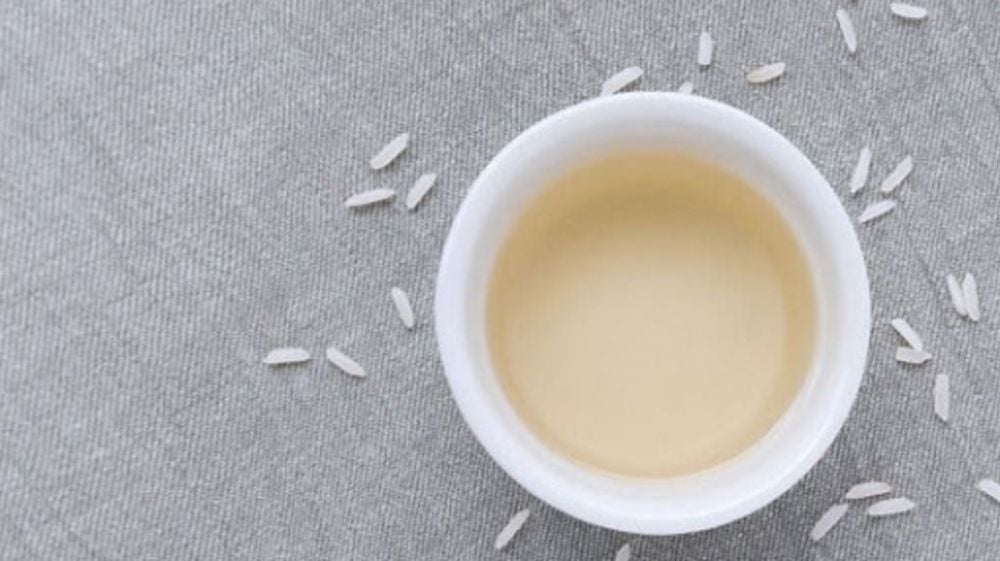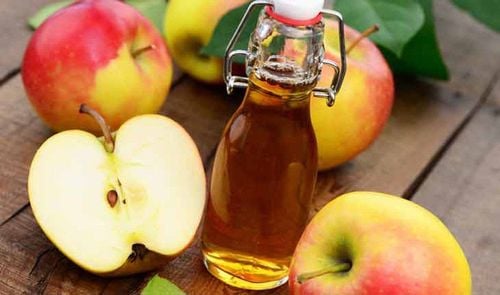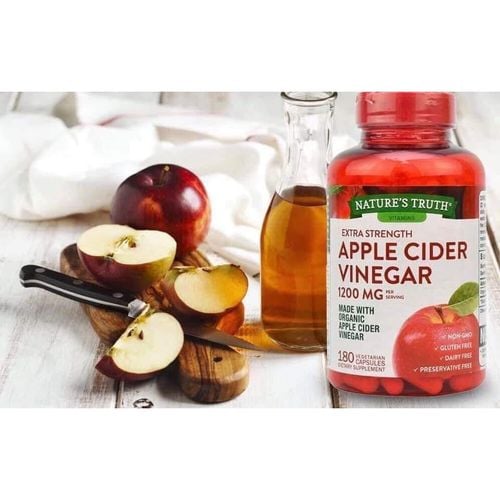This is an automatically translated article.
Rice wine and rice vinegar are common ingredients in Asian cooking. Although both are made from rice fermentation, they all have many differences. So is rice vinegar and rice wine good?1.What's the difference between rice wine and rice vinegar? Both rice wine and rice vinegar are made from fermented rice, however basically rice wine and rice vinegar are very different:
1.1. Differences in processing Rice wine is an alcoholic beverage, commonly used as a beverage and used in recipes. In Japan, rice wine, also known as sake, is considered the country's national drink. Other versions of rice wine used for cooking include Japanese mirin and Chinese huangjiu.
Rice wine is obtained through the fermentation of rice starch using yeast, mold and lactic acid bacteria to produce alcohol. For example, the fungus Aspergillus oryzae converts starch into sugar, and the yeast Saccharomyces cerevisiae produces alcohol.
Meanwhile, rice vinegar is made by fermenting rice starch using acetic acid-producing bacteria also known as female vinegar (Mycoderma aceti) and a small amount of rice wine to convert the sugar into alcohol, then into acetic acid.
Many people sometimes mistakenly call rice vinegar “rice wine vinegar”. This is similar to red and white wine vinegar, they don't contain alcohol even though the name says "wine" and of course it's not rice wine either. Chinese rice wine), Mirin (Japanese cooking wine) and Sake (Japanese rice wine) are the most popular types of rice wine.Compared to other rice wines, they have a mild sweetness and low alcohol content.Yes There are many other types of rice wine on the market with different flavors and colors depending on the fermentation process and other ingredients in the recipe such as spices, herbs or fruits, meanwhile, rice vinegar has a sour taste. Similar to other vinegars such as apple cider vinegar Unlike rice wine, rice vinegar is usually only used in small quantities
Due to many differences in taste, we can easily distinguish rice vinegar and rice wine
1.3 Nutritional value Is rice vinegar good or rice wine good is a common question asked by many people. With certain nutritional value, each type will bring different health benefits depending on the intended use, so it will be difficult to compare the nutritional value between vinegar and rice wine.

Rượu gạo và giấm gạo chứa hàm lượng dinh dưỡng khác nhau
With each 150ml of rice wine will provide about 201 calories, 7.5 grams of carbohydrates, no sugar and salt. Meanwhile, 1 tablespoon (about 15ml) of ready-made rice vinegar contains about 30 calories, 8 grams of carbohydrates, 8 grams of sugar and 710 mg of salt. The most obvious difference is that pre-mixed rice vinegar contains sugar and salt, so users can choose unadulterated rice vinegar if they are trying to reduce their consumption of these two ingredients. Besides, there is a sugar-free rice vinegar that will not contain sugar, calories and carbohydrates.
1.4. Purpose of use Rice wine is both used in cooking and widely used as an alcoholic beverage. In cooking, rice wine is often added directly to dishes or to enhance the flavor of sauces. Most Asian countries have a variety of signature rice wine. For example, the popular Cambodian rice wine called Sombai consists of fruit, spices and cane sugar. Meanwhile, Dansul (aka Gamju) is a popular rice wine in Korea.
When it comes to rice vinegar, Chinese, Japanese and Korean varieties are the most popular because of their mild flavor and light yellow color, while Kurozu black vinegar is also a favorite. Rice vinegar is used as a marinade or to flavor sauces, fried rice, pickled vegetables, and sushi. The word sushi actually means "sour rice" or "sour taste" due to the way it is prepared using fermented rice and salt. When rice vinegar is used to mix into the rice, it speeds up the fermentation process and improves the flavor of the sushi.
In short, rice wine is a sweet alcoholic drink and is used in cooking. Rice vinegar is a sour-tasting vinegar used in dishes such as sushi, fried rice, sauces, and salad dressings. Although both are derived from rice, users should not exchange their positions.
2. Alternatives to Rice Vinegar and Rice Wine Due to the significant difference between rice vinegar and rice wine, users should not use rice vinegar and rice wine interchangeably. Instead, we have better alternatives to use in case of need.
2.1. Alternatives to Rice Vinegar There are many options available in the kitchen that can substitute for rice vinegar in a 1-to-1 ratio, although the taste may be slightly different:
Apple Cider Vinegar: Mild Flavor and the color of the vinegar created will be suitable for processing sushi, marinating food and vinegar; Sherry Vinegar: Similar in taste to rice vinegar, it is the ideal substitute for most recipes that call for rice vinegar; White vinegar: Used to make sauces, marinades, and salad dressings; Red Wine Vinegar: The right choice for making food marinades, making sauces and making rich meat dishes; Balsamic Vinegar: Best for salad dressing or marinating baked goods, including chicken and pizza; Lemon juice : Twice as sour as rice vinegar, ideal for making sauces and salad dressings; Champagne vinegar: With a mild flavor, it is suitable for seafood dishes, marinades, sauces and salad dressings. Besides, to create the sweetness of rice vinegar, users can add a little sugar or sweetener at will.

Giấm táo là một trong những lựa chọn thay thế cho giấm gạo và rượu gạo
2.2. Rice Wine Alternatives Users can use the following alternatives to rice wine in cooking:
Sherry: This is a good alternative to Mirin due to its similar color and taste, user-replaceable at a 1-to-1 ratio; Gin: Similar in taste, it is a good substitute for white rice wine. However, users should only use 1⁄2 to 3⁄4 of the amount of rice wine needed or add it slowly to achieve the desired taste; White wine: Without Gin, white wine can easily replace rice wine with a ratio of 1-1; Dry Sherry: To replace Shaoxing (black rice wine), please use dry sherry and appropriate amount of sugar; Grape juice: A suitable alternative to rice wine for people who cannot use alcohol when preparing dishes is grape juice. Accordingly, you can squeeze half a lemon to increase the acidity. Some options to replace rice wine as a drink:
White wine; Dry vermouth; White grape juice when the user does not want to use alcoholic beverages; Any other rice wine like Huangjiu, Sake, Dansul/Gamju or Mijiu. In a nutshell, rice vinegar and rice wine are both made from fermented rice. However, vinegar must undergo additional processing steps to remove the alcohol and produce acetic acid. Differences in processing create different products and serve different purposes for users.
Rice wine can be used both in cooking and as a drink. The most popular varieties include Huangjiu, Mirin and Sake. Rice vinegar is most commonly used in sushi, marinades, sauces and salad dressings. Users can add a little sugar to apple cider vinegar, sherry vinegar, or white wine vinegar if they want them to take the place of rice vinegar.
Please dial HOTLINE for more information or register for an appointment HERE. Download MyVinmec app to make appointments faster and to manage your bookings easily.
Reference source: healthline.com













